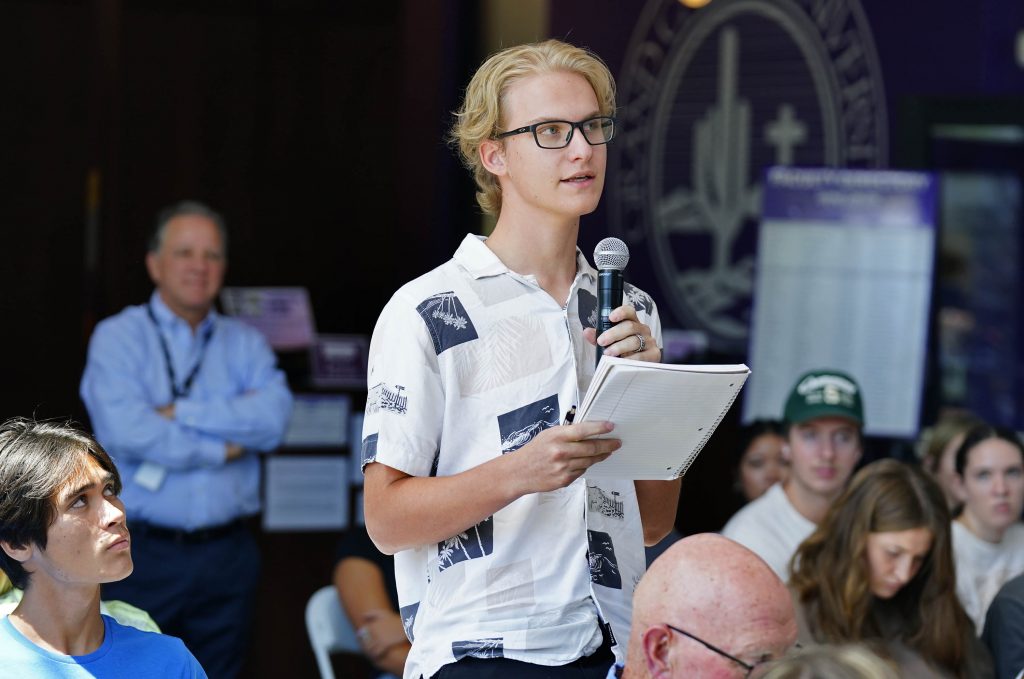
Photos by Ralph Freso
George Holm, who made an impact as a basketball player at Grand Canyon University, is now making an impact by helping build a global supply food chain system with his Fortune 100 company.
He shared the intricacies of that system with GCU students on Thursday at the packed Colangelo College of Business lobby as part of the inaugural talk in the T.W. Lewis Speaker Series.
“In the U.S., we produce more food than we can consume,” said Holm, chairman and chief executive officer of Performance Food Group.
Holm, joined by the company's vice president of protein, Steve Sands, spoke and answered questions for more than an hour.
For Holm, who was inducted into the GCU Hall of Fame in 2019 – more than 40 years after excelling on the men’s basketball team and graduating with a degree in business administration – it was an honor to lend insight about PFG and its business practices.

“I learned a lot about people,” Holm said after his talk about his time as a student at GCU. “I loved playing basketball. I got serious after college, but I enjoyed my time here. It was great.
“I (learned) about ethics (at GCU).”
He carried those experiences to his business dealings. PFG and its chain of companies deliver food to more than 300,000 independent and chain restaurants, businesses, schools, health-care facilities, big box retail companies, theatres and convenience stores.
“By 2050, we will need to increase our food distribution by 70%,” said Holm, using a chart to illustrate the projected spurt in population.
PFG, based in Richmond, Virginia, oversees three divisions – Performance Foodservice (food producer and supplier), Vistar (candy, snack and beverage distributor) and Core-Mark (made-to-order foods for convenience stores).
“Having someone of George’s success, especially as a graduate, share his insight with business, supply chain, and nutrition students was just phenomenal,” said GCU Provost and Chief Academic Officer Dr. Randy Gibb.

“His stories of building global supply chain food systems with integrity was great to hear and connected with GCU’s curriculum and approach to business. He is a great example of a GCU alumnus, leading a Fortune 100 company with character.”
Holm elaborated on the differences between the United States and other countries, specifically China, in its food consumption, use of corn and fertilizers.
One of the more fascinating topics Holm and Sands discussed were the changes in the industry. For instance, if it were not for synthetic fertilizers, “half the population would die from famine,” Holm said.
Furthermore, the war in Ukraine has caused fertilizer prices to soar and profits to fall dramatically. “It’s going to cause some real issues for us in the future,” Holm said.

But it was hardly a gloom-and-doom session.
Holm marveled at innovations that have allowed food distribution to be effective for centuries at a massive savings. The construction of dredged rivers in the 1800s came at 1/12th the cost of rail transportation and 1/25th the cost of trucking.
Ports located on the East Coast have allowed super tankers to distribute food all over the world.
“We are critical to not only production of food, (but also) getting food to the rest of the world,” Holm said.
Sands explained the reason for price volatility in beef stems from the 39-month cycle for a cow to mature. “The reason poultry is so much cheaper in grocery stores is (because) it’s a better converter of corn and beef,” Sands said.
Sands emphasized that PFG is committed to traceability, authenticity and accountability in the wake of food fraud becoming a $40 billion annual industry, citing a Harvard Business School study.
Holm and Sands take pride in PFG dealing directly with farmers, limiting the travel distance for cattle to packing houses to a 150-mile limit, and leading the charge toward the banning of Zilmax, a drug that Sands said could add 150 pounds to a 1,200-pound steer in the last 20 days of its life.

“Bad stuff,” said Sands, adding that PFG’s pure meat graded better before eventually several competitors stopped producing beef injected with Zilmax.
Business college Dean John Kaites, who moderated the event, asked Sands which fast food company produced the best hamburger.
Sands believes that choice depends on what one’s principles are, suggesting some might prefer an organic burger. But Sands pointed to Shake Shack for its commitment to not using hormones or antibiotics in its meat.
In running a business that has earned Fortune 100 status, Holm said one of the biggest mistakes young professionals make is giving up too soon between jobs.
“It comes down to frontline supervision,” Holm said. “We have to find unique people that we can keep them motivated and feel good about what they do, because it’s hard work.”
He acknowledges the food business has changed “tremendously” because of technology and admitted he is not always on the forefront.
Nevertheless, the U.S. has led in advances in food production. “The rest of the world is slow to follow or doesn’t have the money,” Holm said.
One of the greatest advances is a drone that can fly through the corn fields, spot a pest and spray, or spot a section of corn that is not receiving enough water and can be addressed with irrigation or more fertilizer.
“It’s amazing but extremely expensive,” Holm said of that technology, adding how the price goes down if you just wait, though also acknowledging, “We need to move faster with those things.”
GCU News senior writer Mark Gonzales can be reached at [email protected]
***
Related content:
GCU News: New CCOB dean brings vast experience, versatility
GCU News: Artificial intelligence pioneer gets real about keeping up with tech



































































